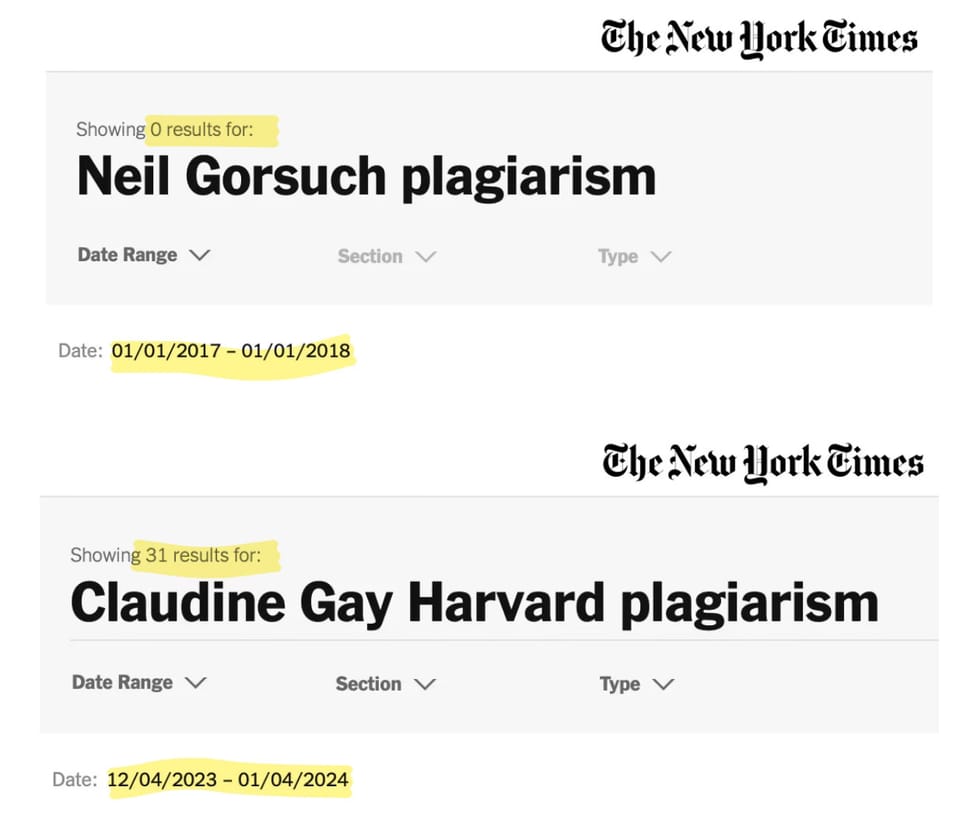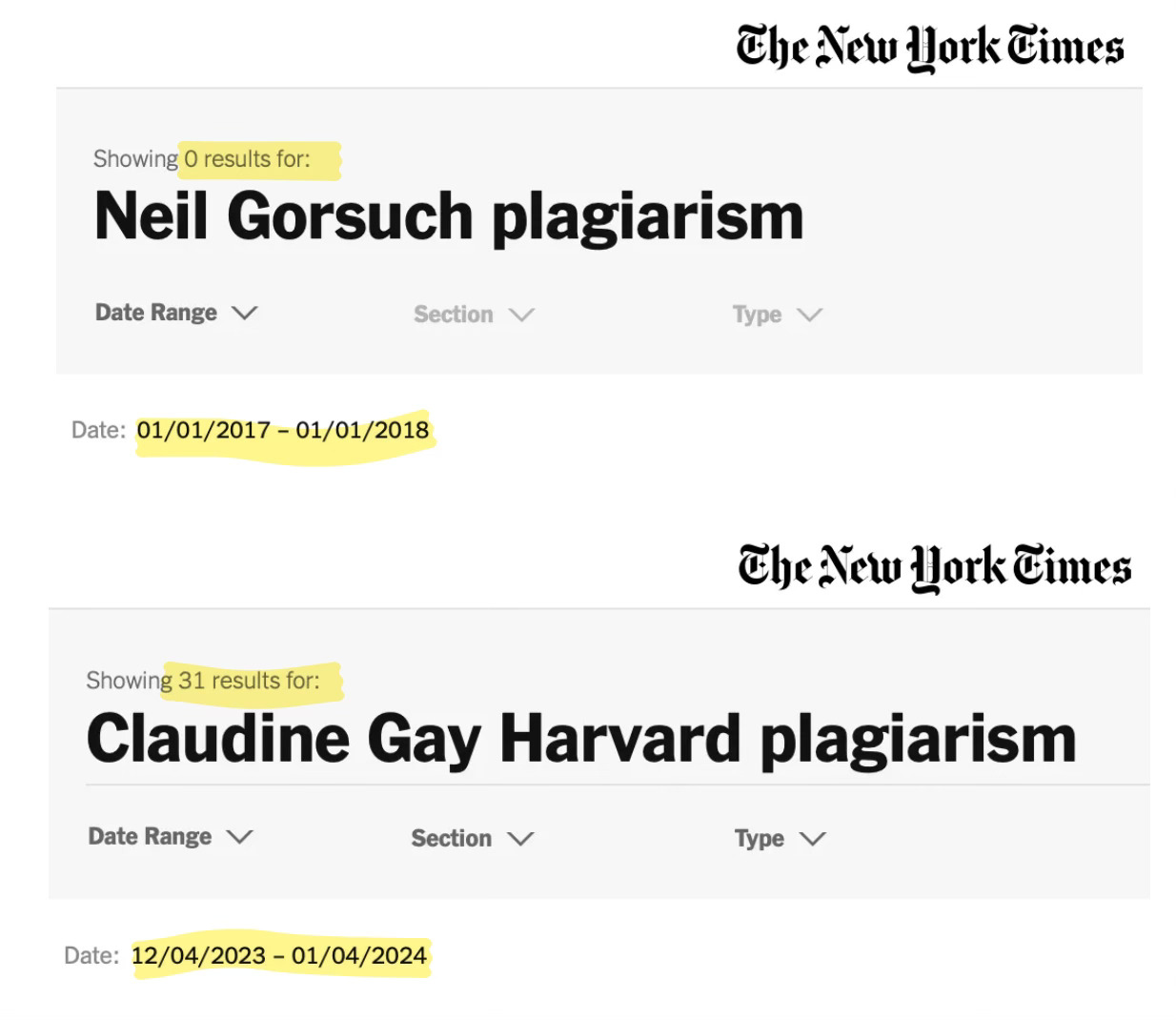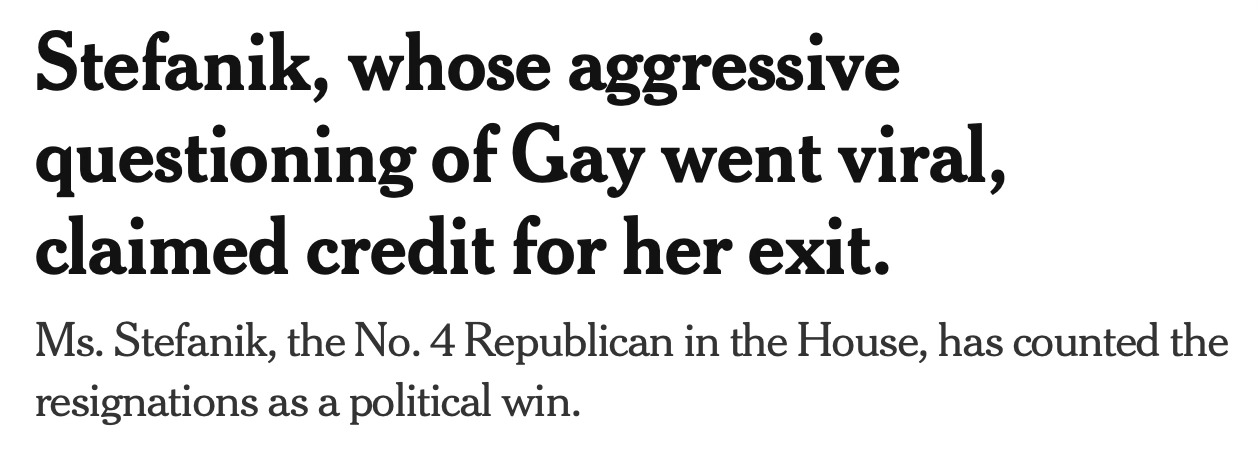Here's how the New York Times covered plagiarism by a Trump Supreme Court nominee

In the wake of Harvard’s president resigning after a month of wall-to-wall New York Times coverage of plagiarism allegations against her, a lot of people are recalling plagiarism allegations against Supreme Court justice Neil Gorsuch that arose shortly after Donald Trump nominated him to the high court in 2017.
That got me wondering: How did the New York Times cover the Gorsuch plagiarism allegations during his confirmation fight? My hypothesis was “minimally,” but the actual answer, as far as I can tell, is that it didn’t.1

When the Gorsuch plagiarism story broke during his confirmation fight, Politico reported:
“Each of the individual incidents constitutes a violation of academic ethics. I’ve never seen a college plagiarism code that this would not be in violation of,” said Rebecca Moore Howard, a Syracuse University professor who has written extensively on the issue.
Elizabeth Berenguer, an associate professor of law at Campbell Law School, said that under legal or academic standards Gorsuch’s similarities to the Indiana Law Journal would be investigated “as a potential violation of our plagiarism policy. It’s similar enough to the original work.”
Oregon Senator Jeff Merkley read a report about the Gorsuch plagiarism aloud on the floor of the Senate during debate over Gorsuch’s nomination. The Gorsuch plagiarism story was covered by everyone from the Washington Post to a website called “Plagiarism Today.” (I’ve never heard of Plagiarism Today, but the New York Times has cited it on another matter.)


So the New York Times surely knew about Gorsuch’s plagiarism; there’s simply no way it didn’t. But the New York Times never told its readers that Supreme Court Justice Neil Gorsuch plagiarized parts of his book and an academic article.
That’s because neither the New York Times nor any of the other activists agitating for Claudine Gay’s ouster actually cares even a little bit about minor instances of plagiarism.2 It’s a pretext. What they actually want to do is purge American institutions of diversity. New York Times accomplice Christopher Rufo announced as much in celebrating Gay’s ouster:

That’s DEI as in “Diversity, equity, and inclusion” — three things the right wing simply cannot abide.3
As Claudine Gay noted in an op-ed4 after her resignation:
It is not lost on me that I make an ideal canvas for projecting every anxiety about the generational and demographic changes unfolding on American campuses: a Black woman selected to lead a storied institution. Someone who views diversity as a source of institutional strength and dynamism. Someone who has advocated a modern curriculum that spans from the frontier of quantum science to the long-neglected history of Asian Americans. Someone who believes that a daughter of Haitian immigrants has something to offer to the nation’s oldest university.
That’s what’s really going on here. Nobody involved in driving Gay from Harvard actually cares about her academic jaywalking. Rufo said as much. The New York Times’ complete lack of coverage of Gorsuch’s plagiarism proves it doesn’t really care about such things, either. What Rufo and his accomplices really care about is purging American institutions of diversity; to return to a time when positions of influence were the exclusive domain of white people, primarily white men.
New York Times columnist Bret Stephens is mad that a Black woman got the top Harvard job in the first place:5
The point may now be moot, but the important question for Harvard was never whether Gay should step down. It was why she was brought on in the first place […] The answer, I think, is this: Where there used to be a pinnacle, there’s now a crater. It was created when the social-justice model of higher education, currently centered on diversity, equity and inclusion efforts — and heavily invested in the administrative side of the university — blew up the excellence model, centered on the ideal of intellectual merit and chiefly concerned with knowledge, discovery and the free and vigorous contest of ideas.
That’s the same Bret Stephens who wrote a racist column about “Jewish genius” that cited a study co-authored by a noxious racist, resulting in a spectacularly defensive — and inadequate — editor’s note.6

Neither Stephens nor his employers were tricked by Christopher Rufo or anyone else into waging war on Claudine Gay. You don’t get tricked into publishing dozens of articles in a single month about a single academic. You do it because you want to do it. And, as Stephens’ column indicates, you do it for the same reasons Rufo does it.
Another reason we can be confident the New York Times shares Rufo’s goals is that, as I explained back in July, the Times violated its own stated standards by publishing a Rufo op-ed attacking DEI. I wrote at the time:
Christopher Rufo’s entire approach to these debates is fundamentally dishonest; he has publicly announced as much. Therefore publishing Rufo is an act of dishonesty. It is an intentional effort to mislead your customers; to present them with arguments you know to be dishonest. That’s what The New York Times did today.
The New York Times keeps showing us who they are. It’s long past time liberals start believing them, and stop letting them off the hook by thinking of them as innocent dupes instead of the intentional actors they are.
***
Speaking of which: Last month I explained that in hyping Elise Stefanik’s questioning of university officials about antisemitism, the New York Times was whitewashing Stefanik’s own history of supporting antisemites and spreading antisemitic lies:
From December 5 through December 13, the Times published to its website no fewer than 27 articles, columns, and newsletters mentioning Stefanik's performance in the hearing.2 Those 27 items mention Stefanik by name a total of 141 times and directly quote her 50 times. Want to guess how many times those 27 entries directly note that Stefanik has spread the “replacement” lie?
One.3
This week, the Times published yet another piece hyping Stefanik and portraying her as an aggressive critic of antisemitism:

Naturally, that article omitted any mention of Stefanik spreading the antisemitic “great replacement” lie, or of Stefanik endorsing a candidate who praised Hitler, or of her staunch support for other antisemites. Again: The New York Times knows all of this about Stefanik, and so it knows her attacks on Gay are insincere. It just won’t tell readers, or even hint at it.
I guess it’s possible I’m missing an example but I’ve looked pretty thoroughly, and can find no reference to Gorsuch’s plagiarism in the New York Times during his confirmation fight. The only reference to it I can find at all, ever, is a passing mention more than a year later in an article about Brett Kavanaugh’s nomination. ↩
Yes, it’s plagiarism, and yes, it’s minor, just like Gorsuch’s, which should not have kept him off the Supreme Court. His general odiousness, along with the deeply anti-democratic machinations Republicans deployed to illegitimately prevent Barack Obama from filling the seat, giving Trump the opportunity to nominate Gorsuch, should have kept Gorsuch off the Court. But not the minor plagiarism. I can’t believe I’m saying this, but: I agree with Noah Feldman. ↩
Not the only three things, though. ↩
In the New York Times. Here’s a link if you’d like to read it, though IMO the Times’ has gotten more than enough clicks out of this whole shameful mess. ↩
Please do not click this link, he doesn’t not need the encouragement. ↩
That’s also the same Brett Stephens who got hired by the world’s most influential newspaper despite a well-documented history of writing absolute nonsense about, among other things, climate change — and who then made a factual error about climate change in his very first column in the Times. Guy’s not exactly the poster child for “intellectual merit,” is my point. ↩
Member discussion